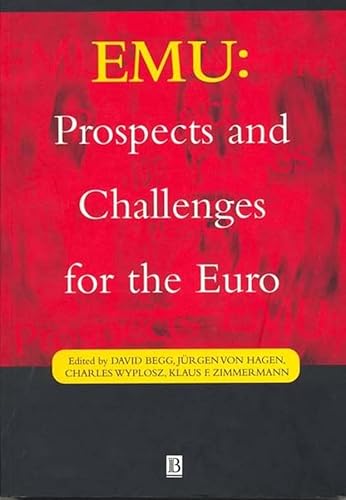Items related to Emu: Prospects and Challenges for the Euro

- Includes the views of top economists from Europe and around the world.
- Presents vital information in a non-technical language.
- Contains penetrating discussions by a distinguished panel of experts.
"synopsis" may belong to another edition of this title.
Kenneth Rogoff (Princeton University) discusses the role of the EU in the world's underground economy, suggesting that it is quite plausible for approximately one-half of euro currency to be held outside the legal domestic economy of Europe, and this is fostered by the plan of issuing large euro denomination notes.
Barry Eichengreen (University of California, Berkeley) and Charles Wyplosz (Graduate Institute of International Studies, University of Geneva) analyze whether a Stability Pact is really needed in order to underpin EMU, provide new evidence on whether the Pact will reduce financial contagion, and assess how much the ceiling on budget deficits will exacerbate normal cyclical recessions.
Antonio Fatés (INSEAD, Fontainebleau) examines the correlation and persistence of shocks, and their implications for potential fiscal flows within EMU. He argues that the benefits that a European-wide fiscal federation would add to the output smoothing that individual countries can achieve via their own fiscal policy do not compensate the costs associated with its implementation.
Rudiger Dornbusch (MIT), Carlo Favero (IGIER, Universita Bocconi) and Francesco Giavazzi (IGIER, Universita Bocconi) challenge previous estimates of asymmetries in monetary transmission across potential EMU members, relate their new estimates of asymmetry to differences in financial structure, and discuss implications for a common monetary policy in EMU.
Richard Portes (London Business School) and Hélène Rey (Centre for Economic Performance, LSE) examine whether the euro will displace the US dollar as the world's leading currency. Looking at synergies between financial and foreign exchange markets, they conclude that the most likely ultimate outcome is a bipolar world, where the euro and the dollar share leadership.
Marc Flandreau (OFCE, Paris), Jacques Le Cacheux (OFCE, Paris) and Frédéric Zumer (Service d'Étude de l'Activitie Economique, Paris) ask if there are lessons to be learnt from the Gold Standard period when all currencies were 'permanently' tied to gold, yet there were no policy rules similar to the Stability Pact. They find that numerous countries at the periphery of Europe were forced to suspend convertibility in the wake of serious public debt build-ups in the mid-1890s, but that once they re-entered, fiscal discipline was strictly enforced.
Maurice Obstfeld and Giovanni Peri (both at University of California, Berkeley) use regional data to document how slowly regions within European countries respond to shocks, discuss consequent pressures for fiscal transfers, and assess the extent to which EMU exacerbates these problems.
Jurgen Von Hagen was Assistant and Associate Professor of Business Economics at Indiana University between 1987-92, and Professor of Economics at the University of Mannheim between 1992-6. He has been Professor of Economics and Director of the Center for European Integration Studies at the University of Bonn since 1996. He was the first winner of the Gossen Prize of the Verein fur Sozialpolitik - the German Economic Association - in 1997. He has published more than 40 articles in international, refereed academic journals and over 60 contributions to non-refereed journals and books. He is Co-Editor of Open Economics Review and a member of the editorial board of the Journal of International Finance and Economics and the European Economic Review. His consulting activities include positions at the IMF, the European Commission, the Federal Reserve Board, and the Interamerican Bank.
Charles Wyplosz is Professor of Economics at the Graduate Institute of International Studies, University of Geneva, and a Research Fellow in CEPR's International Macroeconomics and Transition Economics research programmes. He has published widely on exchange rates, macroeconomic policy and labor markets. He serves on the Scientific Councils of NIESR in London, EPRU at the University of Copenhagen, and CES, University of Munich. He is a member of the editorial board of the Journal of the Japanese and International Economies, Annales d'Economie et de Statistiques, the International Journal of Finance and Economics, Moneda y Credito and Weltwirtschaftliches Archiv. He is an adviser to the government of the Russian Federation and has been consultant to the lMF, the World Bank, the French government, the European Commission, the Harvard Institute for International Development, and the Committee for the Study of the Independence of the Bank of England.
Klaus F. Zimmermann is Professor of Economics and Director of SELAPO at the University of Munich; Co-Director of CEPR's Human Resources research programme; Associate Editor of the European Economic Review, the Journal of Applied Econometrics, Labor Economics, and Recherches Economiques de Louvain. He is also Editor-in-Chief of the Journal of Population Economics and a Council member of the European Society for Population Economics and the European Economic Association. He has published on a variety of issues surrounding population change, migration, the labour market, education, technical progress, business survey analysis and microeconometrics. As a recognized authority in these areas he has also served as a consultant to the World Bank, the European Parliament, the German Parliament and the German Federal Government.
"About this title" may belong to another edition of this title.
- PublisherBlackwell Pub
- Publication date1998
- ISBN 10 0631209972
- ISBN 13 9780631209973
- BindingPaperback
- Edition number1
- Number of pages351
- EditorBegg David, Wyplosz Charles, Zimmermann Klaus F., Menil Georges De, Portes Richard, Sinn Hans-Werner
Buy New
Learn more about this copy
Shipping:
FREE
Within U.S.A.
Top Search Results from the AbeBooks Marketplace
EMU : PROSPECTS AND CHALLENGES FOR THE EURO (PB)
Book Description Condition: Brand New. New. US edition. Expediting shipping for all USA and Europe orders excluding PO Box. Excellent Customer Service. Seller Inventory # ABEOCT23-234728

